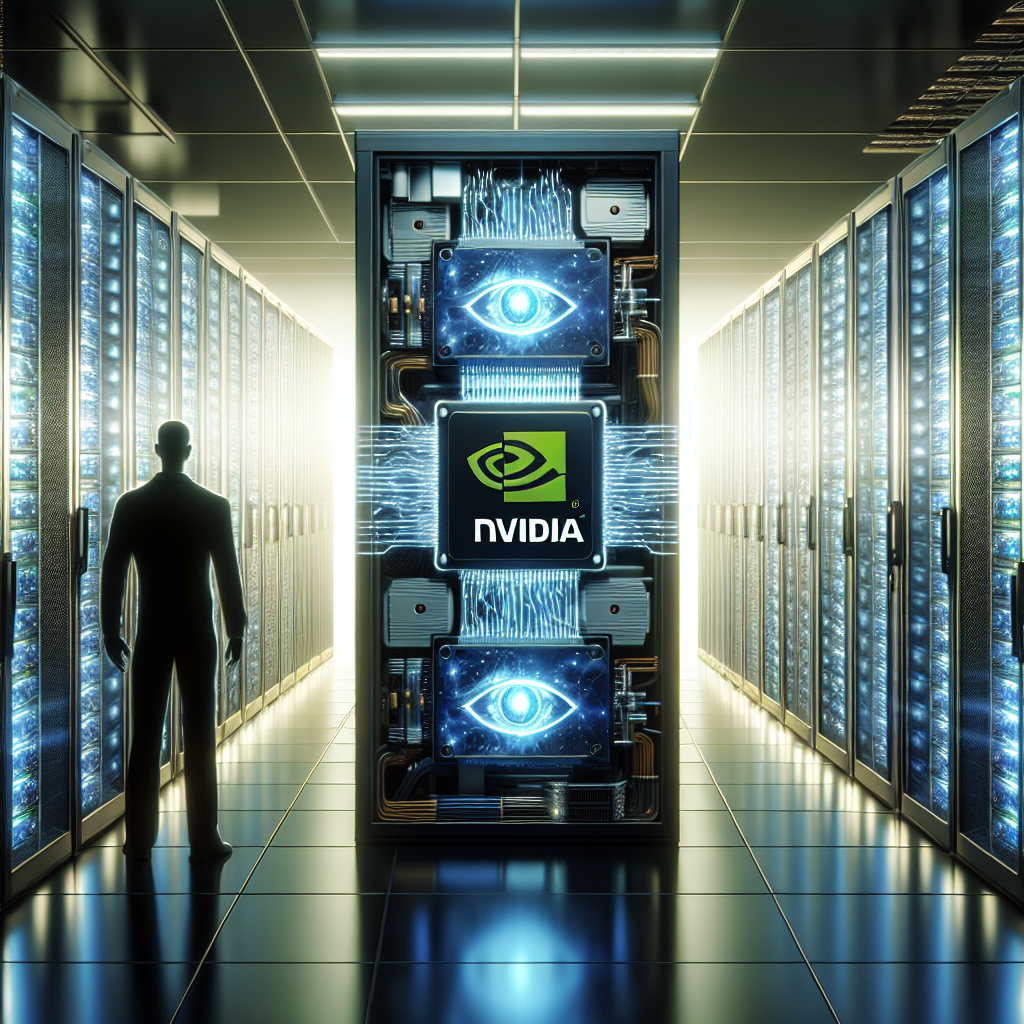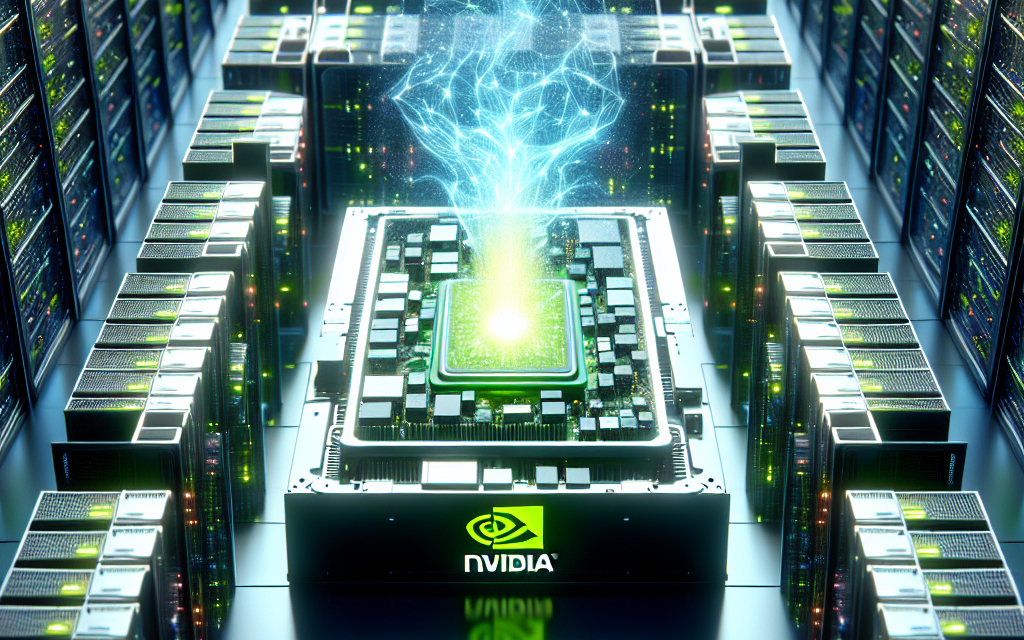“Powering the Future: Cisco’s AI Leap with Nvidia, Taking on Dell in the Server Arena.”
Introduction
In a strategic maneuver to redefine its position in the competitive tech landscape, Cisco has announced a bold expansion into the AI server market, leveraging Nvidia’s cutting-edge chips. This move signifies Cisco’s ambition to challenge industry stalwarts like Dell by integrating advanced AI capabilities into its server offerings. By harnessing Nvidia’s powerful GPUs, Cisco aims to deliver enhanced performance and efficiency, catering to the growing demand for AI-driven solutions across various sectors. This initiative not only underscores Cisco’s commitment to innovation but also highlights its strategic pivot towards AI and machine learning technologies, positioning itself as a formidable contender in the evolving server market.
Cisco’s Strategic Shift: Embracing AI Servers with Nvidia Chips
In a significant strategic shift, Cisco Systems has announced its intention to expand its server offerings by integrating Nvidia chips, a move that positions the company to directly challenge industry leader Dell in the burgeoning field of artificial intelligence (AI) servers. This development marks a pivotal moment for Cisco, traditionally known for its networking hardware, as it seeks to diversify its product portfolio and capitalize on the growing demand for AI-driven solutions. By leveraging Nvidia’s advanced graphics processing units (GPUs), Cisco aims to enhance the computational power and efficiency of its servers, thereby meeting the increasing needs of businesses that rely on AI technologies.
The decision to incorporate Nvidia chips into its servers is a calculated response to the evolving technological landscape, where AI and machine learning applications are becoming integral to business operations across various sectors. As organizations strive to harness the potential of AI to gain competitive advantages, the demand for robust and efficient computing infrastructure has surged. Cisco’s move to embrace AI servers is not only a response to this demand but also a proactive step to secure a foothold in a market that is expected to grow exponentially in the coming years.
Nvidia, renowned for its cutting-edge GPU technology, has established itself as a leader in the AI hardware space. Its chips are designed to handle the complex computations required for AI applications, making them an ideal choice for companies looking to enhance their server capabilities. By partnering with Nvidia, Cisco is poised to offer servers that can deliver superior performance, scalability, and energy efficiency, attributes that are crucial for businesses seeking to implement AI solutions at scale.
This strategic partnership also underscores Cisco’s commitment to innovation and its willingness to adapt to changing market dynamics. Historically, Cisco has been a dominant player in the networking industry, but the rapid advancement of AI technologies presents both challenges and opportunities. By expanding into the AI server market, Cisco is not only diversifying its revenue streams but also positioning itself as a key player in the next wave of technological transformation.
Moreover, this move is likely to intensify competition with Dell, a company that has long been a leader in the server market. Dell’s stronghold in this sector is largely attributed to its comprehensive range of server solutions and its ability to cater to diverse customer needs. However, Cisco’s entry into the AI server space, bolstered by Nvidia’s powerful chips, could disrupt the status quo and offer customers an attractive alternative. This competition is expected to drive innovation and potentially lead to more advanced and cost-effective solutions for end-users.
In conclusion, Cisco’s decision to integrate Nvidia chips into its server offerings represents a bold and strategic move to capture a share of the rapidly expanding AI server market. By aligning itself with Nvidia, Cisco is not only enhancing its product capabilities but also signaling its intent to be a formidable competitor in the AI space. As the demand for AI-driven solutions continues to rise, Cisco’s expanded server offerings could play a crucial role in shaping the future of enterprise computing, providing businesses with the tools they need to thrive in an increasingly digital world. This development is a testament to Cisco’s strategic foresight and its commitment to remaining at the forefront of technological innovation.
The Competitive Landscape: Cisco vs. Dell in AI Server Market
In the rapidly evolving landscape of artificial intelligence, the competition among technology giants to dominate the AI server market is intensifying. Cisco Systems, a leader in networking and IT infrastructure, has made a strategic decision to expand its AI server offerings by incorporating Nvidia chips, a move that positions it as a formidable competitor to Dell Technologies. This development is not only a testament to Cisco’s commitment to innovation but also a reflection of the growing demand for advanced computing solutions capable of handling complex AI workloads.
Cisco’s decision to integrate Nvidia’s cutting-edge chips into its AI servers is a calculated effort to enhance its product portfolio and capture a larger share of the burgeoning AI market. Nvidia, renowned for its powerful graphics processing units (GPUs), has become a pivotal player in the AI industry, providing the computational power necessary for machine learning and deep learning applications. By leveraging Nvidia’s technology, Cisco aims to offer AI servers that deliver superior performance, efficiency, and scalability, thereby meeting the needs of enterprises seeking to harness the potential of AI.
This strategic move by Cisco is particularly significant in the context of its rivalry with Dell, a company that has long been a dominant force in the server market. Dell’s extensive experience and established customer base have given it a competitive edge, but Cisco’s partnership with Nvidia could potentially disrupt the status quo. By aligning with Nvidia, Cisco is not only enhancing its technological capabilities but also signaling its intent to challenge Dell’s supremacy in the AI server domain.
Moreover, Cisco’s expansion into AI servers underscores the broader industry trend of convergence between networking and computing. As AI applications become increasingly data-intensive, the need for seamless integration between networking infrastructure and computing resources has become paramount. Cisco, with its expertise in networking, is uniquely positioned to offer solutions that address this convergence, providing customers with a comprehensive ecosystem that supports AI-driven innovation.
In addition to technological advancements, Cisco’s strategic move also reflects the growing importance of partnerships in the tech industry. Collaborations between companies like Cisco and Nvidia highlight the value of combining complementary strengths to drive innovation and deliver enhanced solutions to the market. Such partnerships not only accelerate product development but also enable companies to respond more effectively to the dynamic demands of the AI landscape.
Furthermore, Cisco’s entry into the AI server market with Nvidia chips is likely to have implications for the competitive dynamics of the industry. As more companies recognize the transformative potential of AI, the demand for high-performance servers is expected to surge. This presents both opportunities and challenges for players like Cisco and Dell, as they strive to differentiate themselves and capture market share. The introduction of AI servers powered by Nvidia chips could serve as a catalyst for further innovation, prompting competitors to enhance their offerings and drive the industry forward.
In conclusion, Cisco’s bold move to expand its AI server portfolio with Nvidia chips marks a significant development in the competitive landscape of the AI server market. By leveraging Nvidia’s technology, Cisco is positioning itself as a strong contender against Dell, while also addressing the growing demand for advanced computing solutions. This strategic decision not only highlights the importance of technological innovation and partnerships but also underscores the evolving nature of the industry as companies strive to harness the power of AI. As the competition intensifies, the ultimate beneficiaries will be the enterprises that gain access to cutting-edge solutions capable of transforming their operations and driving future growth.
Nvidia’s Role in Cisco’s AI Server Expansion
In the rapidly evolving landscape of artificial intelligence, Cisco Systems has made a strategic decision to expand its AI server capabilities, a move that underscores its ambition to challenge industry giants like Dell. Central to this expansion is Cisco’s collaboration with Nvidia, a leader in AI hardware and software solutions. This partnership is poised to redefine the competitive dynamics within the AI server market, leveraging Nvidia’s cutting-edge technology to enhance Cisco’s offerings.
Nvidia’s role in this expansion is pivotal, as its advanced graphics processing units (GPUs) are integral to the performance and efficiency of AI servers. These GPUs are designed to handle the complex computations required for AI applications, making them indispensable for companies looking to harness the power of artificial intelligence. By integrating Nvidia’s chips into its servers, Cisco aims to deliver superior performance, scalability, and energy efficiency, which are critical factors for businesses deploying AI solutions.
The collaboration between Cisco and Nvidia is not merely a technological integration but a strategic alignment that reflects the growing demand for AI-driven solutions across various industries. As businesses increasingly rely on AI to drive innovation and efficiency, the need for robust and reliable server infrastructure becomes paramount. Cisco’s decision to incorporate Nvidia’s technology is a testament to its commitment to meeting this demand and positioning itself as a formidable player in the AI server market.
Moreover, this partnership highlights the broader trend of convergence between networking and AI technologies. Cisco, traditionally known for its networking solutions, is leveraging its expertise to create a seamless integration of AI capabilities within its existing infrastructure. This approach not only enhances the functionality of its servers but also provides customers with a comprehensive solution that addresses both networking and AI needs. By doing so, Cisco is setting itself apart from competitors like Dell, which have primarily focused on traditional server offerings.
In addition to the technological advantages, the collaboration with Nvidia offers Cisco a strategic edge in terms of market positioning. Nvidia’s reputation as a leader in AI technology lends credibility to Cisco’s AI server offerings, making them more attractive to potential customers. This partnership also enables Cisco to tap into Nvidia’s extensive ecosystem of AI developers and researchers, fostering innovation and accelerating the development of new AI applications.
Furthermore, the integration of Nvidia’s chips into Cisco’s servers aligns with the growing emphasis on sustainability and energy efficiency in the tech industry. Nvidia’s GPUs are renowned for their energy-efficient design, which reduces the overall power consumption of AI servers. This is a significant consideration for businesses looking to minimize their environmental impact while maximizing computational power. By offering energy-efficient solutions, Cisco is not only addressing the needs of its customers but also contributing to the broader goal of sustainable technology development.
In conclusion, Cisco’s bold move to expand its AI server capabilities with Nvidia chips represents a strategic initiative to challenge established players like Dell. Through this collaboration, Cisco is poised to deliver enhanced performance, scalability, and energy efficiency, meeting the growing demand for AI-driven solutions. As the convergence of networking and AI technologies continues to shape the industry, Cisco’s partnership with Nvidia positions it as a leader in the AI server market, offering a comprehensive and sustainable solution for businesses worldwide.
How Cisco’s AI Server Initiative Impacts the Tech Industry

Cisco’s recent announcement to expand its AI server offerings using Nvidia chips marks a significant shift in the competitive landscape of the tech industry. This strategic move is poised to challenge established players like Dell, signaling Cisco’s intent to become a formidable force in the AI server market. As the demand for AI-driven solutions continues to surge, the implications of Cisco’s initiative are far-reaching, affecting various stakeholders within the technology sector.
To begin with, Cisco’s decision to integrate Nvidia’s cutting-edge chips into its AI servers underscores the growing importance of high-performance computing in the era of artificial intelligence. Nvidia, renowned for its powerful GPUs, has become a pivotal player in the AI hardware space, providing the computational muscle required for complex machine learning tasks. By leveraging Nvidia’s technology, Cisco aims to deliver AI servers that offer superior performance, efficiency, and scalability. This move not only enhances Cisco’s product portfolio but also positions it as a serious contender in a market traditionally dominated by companies like Dell.
Moreover, Cisco’s AI server expansion is likely to intensify competition within the tech industry, prompting other companies to reassess their strategies. Dell, a long-standing leader in the server market, may face increased pressure to innovate and differentiate its offerings. As Cisco gains traction with its AI servers, Dell and other competitors will need to explore new avenues for growth, potentially leading to accelerated advancements in server technology. This competitive dynamic could ultimately benefit consumers, as companies strive to deliver more powerful and cost-effective solutions.
In addition to reshaping competitive dynamics, Cisco’s initiative has broader implications for the tech industry as a whole. The integration of AI capabilities into server infrastructure is becoming increasingly critical as businesses across sectors seek to harness the power of artificial intelligence. From data analytics to automation, AI-driven applications are transforming how organizations operate, making robust server solutions essential. Cisco’s entry into this space not only expands the options available to enterprises but also underscores the growing convergence of networking and computing technologies.
Furthermore, Cisco’s partnership with Nvidia highlights the importance of collaboration in driving technological innovation. By aligning with a leader in AI hardware, Cisco can tap into Nvidia’s expertise and resources, accelerating the development of its AI server offerings. This collaboration exemplifies a broader trend within the tech industry, where companies are increasingly joining forces to tackle complex challenges and deliver cutting-edge solutions. As a result, partnerships like this one are likely to become more prevalent, fostering an environment of shared knowledge and innovation.
Finally, Cisco’s AI server initiative may have implications for the broader economy, particularly in terms of job creation and workforce development. As demand for AI-driven solutions grows, there will be a corresponding need for skilled professionals who can design, implement, and manage these technologies. Cisco’s expansion into the AI server market could stimulate job growth in areas such as engineering, data science, and IT support. Additionally, it may encourage educational institutions to develop programs that equip students with the skills needed to thrive in an AI-driven world.
In conclusion, Cisco’s bold move to expand its AI server offerings with Nvidia chips is set to have a profound impact on the tech industry. By challenging established players like Dell, Cisco is reshaping competitive dynamics and driving innovation in server technology. This initiative not only highlights the growing importance of AI in business operations but also underscores the value of collaboration in advancing technological progress. As the industry evolves, Cisco’s strategic expansion is likely to influence various aspects of the tech landscape, from competition and collaboration to workforce development and economic growth.
The Future of AI Servers: Cisco’s Vision and Strategy
In the rapidly evolving landscape of artificial intelligence, the demand for robust and efficient AI servers is surging. Cisco Systems, a stalwart in the networking and communications sector, is making a strategic pivot to capitalize on this burgeoning market. By integrating Nvidia chips into their AI server offerings, Cisco aims to challenge the dominance of Dell Technologies, a leader in the server market. This bold move underscores Cisco’s vision to not only diversify its product portfolio but also to position itself as a formidable player in the AI server domain.
The integration of Nvidia chips is a calculated decision, reflecting Cisco’s commitment to leveraging cutting-edge technology to enhance performance and efficiency. Nvidia, renowned for its prowess in graphics processing units (GPUs), has been at the forefront of AI hardware development. Their chips are designed to handle the complex computations required for AI applications, making them an ideal choice for Cisco’s new line of servers. By incorporating Nvidia’s advanced technology, Cisco is poised to offer AI servers that deliver superior computational power and energy efficiency, key factors that are increasingly important to businesses investing in AI infrastructure.
Moreover, Cisco’s strategic partnership with Nvidia is indicative of a broader trend in the tech industry, where collaboration between companies is becoming essential to drive innovation. This alliance not only benefits Cisco by enhancing its product capabilities but also allows Nvidia to expand its reach in the server market. As AI continues to permeate various sectors, from healthcare to finance, the demand for high-performance servers is expected to grow exponentially. Cisco’s move to integrate Nvidia chips positions it well to capture a significant share of this expanding market.
In addition to technological advancements, Cisco’s strategy involves a comprehensive approach to customer engagement and support. Recognizing that businesses require more than just hardware, Cisco is focusing on providing a holistic solution that includes software, services, and support. This approach is designed to help customers seamlessly integrate AI capabilities into their existing infrastructure, thereby maximizing the value of their investment. By offering a complete package, Cisco aims to differentiate itself from competitors like Dell, which has traditionally focused on hardware.
Furthermore, Cisco’s expansion into the AI server market aligns with its long-term vision of becoming a leader in digital transformation. As organizations increasingly adopt AI to drive innovation and efficiency, the need for reliable and scalable infrastructure becomes paramount. Cisco’s investment in AI servers is a testament to its commitment to supporting businesses in their digital transformation journeys. By providing cutting-edge technology and comprehensive support, Cisco is positioning itself as a trusted partner for organizations looking to harness the power of AI.
In conclusion, Cisco’s decision to expand its AI server offerings with Nvidia chips is a strategic move that reflects its vision for the future. By leveraging advanced technology and focusing on customer-centric solutions, Cisco is well-positioned to challenge established players like Dell in the AI server market. As the demand for AI infrastructure continues to grow, Cisco’s bold move could redefine the competitive landscape and solidify its position as a leader in the digital transformation era. Through strategic partnerships and a commitment to innovation, Cisco is poised to play a pivotal role in shaping the future of AI servers.
Challenges and Opportunities in Cisco’s AI Server Expansion
Cisco Systems Inc. has recently made a strategic decision to expand its AI server offerings by incorporating Nvidia chips, a move that positions the company to directly challenge industry leader Dell Technologies. This bold initiative underscores Cisco’s commitment to strengthening its foothold in the rapidly evolving artificial intelligence (AI) landscape. However, this expansion is not without its challenges and opportunities, which Cisco must navigate to ensure success.
The integration of Nvidia chips into Cisco’s AI servers is a significant step forward, as Nvidia is renowned for its cutting-edge graphics processing units (GPUs) that are essential for AI workloads. These GPUs are designed to handle the complex computations required for machine learning and deep learning applications, making them a critical component in the development of AI technologies. By leveraging Nvidia’s advanced chips, Cisco aims to enhance the performance and efficiency of its AI servers, thereby offering a competitive alternative to Dell’s established products.
One of the primary challenges Cisco faces in this endeavor is the intense competition within the AI server market. Dell Technologies has long been a dominant player, with a well-established customer base and a reputation for delivering reliable and high-performance servers. To compete effectively, Cisco must not only match but exceed the capabilities of Dell’s offerings. This requires significant investment in research and development to ensure that its AI servers are equipped with the latest technological advancements and can meet the diverse needs of its clients.
Moreover, Cisco must address the challenge of market perception. As a company traditionally associated with networking hardware, Cisco needs to convince potential customers of its expertise and reliability in the AI server domain. Building trust and credibility in this new market segment will be crucial for Cisco’s success. This may involve strategic partnerships, targeted marketing efforts, and showcasing successful case studies to demonstrate the tangible benefits of its AI server solutions.
Despite these challenges, the opportunities for Cisco in the AI server market are substantial. The demand for AI technologies is growing exponentially across various industries, from healthcare and finance to manufacturing and retail. Organizations are increasingly seeking powerful computing solutions to process large volumes of data and derive actionable insights. By expanding its AI server offerings, Cisco can tap into this burgeoning market and capture a share of the growing demand for AI infrastructure.
Furthermore, Cisco’s existing expertise in networking can be leveraged to offer integrated solutions that combine AI servers with advanced networking capabilities. This holistic approach can provide customers with a seamless and efficient infrastructure that supports their AI initiatives. By capitalizing on its strengths and offering comprehensive solutions, Cisco can differentiate itself from competitors and create a unique value proposition for its clients.
In conclusion, Cisco’s decision to expand its AI server offerings with Nvidia chips represents a bold move to challenge Dell’s dominance in the market. While the company faces significant challenges, including intense competition and the need to build credibility, the opportunities for growth and innovation are immense. By strategically navigating these challenges and capitalizing on its strengths, Cisco has the potential to establish itself as a formidable player in the AI server market, ultimately driving advancements in AI technology and delivering value to its customers.
Market Implications of Cisco’s Bold Move in AI Server Space
Cisco Systems Inc., a global leader in networking and IT infrastructure, has recently made a strategic decision to expand its presence in the artificial intelligence (AI) server market. This move, characterized by the integration of Nvidia chips into its server offerings, is poised to challenge the dominance of established players like Dell Technologies. The implications of this bold move are multifaceted, affecting not only the competitive landscape but also the broader market dynamics.
To begin with, Cisco’s decision to incorporate Nvidia’s cutting-edge chips into its AI servers underscores the growing importance of AI in enterprise computing. Nvidia, renowned for its powerful graphics processing units (GPUs), has become a pivotal player in the AI hardware space. By leveraging Nvidia’s technology, Cisco aims to enhance the performance and efficiency of its servers, thereby meeting the increasing demand for AI-driven applications across various industries. This strategic partnership is expected to provide Cisco with a competitive edge, enabling it to offer robust solutions that cater to the evolving needs of businesses seeking to harness the power of AI.
Moreover, Cisco’s entry into the AI server market with Nvidia chips is likely to intensify competition with Dell, a company that has long been a dominant force in the server industry. Dell’s extensive portfolio and established customer base have positioned it as a formidable competitor. However, Cisco’s innovative approach, coupled with its strong brand reputation, could potentially disrupt Dell’s market share. As businesses increasingly prioritize AI capabilities, the demand for high-performance servers is set to rise, creating opportunities for Cisco to capture a significant portion of the market.
In addition to challenging Dell, Cisco’s move has broader implications for the server market as a whole. The integration of AI capabilities into servers is expected to drive innovation and spur technological advancements. As more companies recognize the value of AI in optimizing operations and enhancing decision-making processes, the demand for AI-enabled servers is anticipated to grow exponentially. This trend is likely to encourage other players in the industry to invest in AI technologies, fostering a competitive environment that promotes continuous improvement and development.
Furthermore, Cisco’s expansion into the AI server space aligns with its broader strategic objectives. The company has been actively diversifying its product offerings to reduce reliance on its traditional networking business. By venturing into the AI server market, Cisco is positioning itself to capitalize on emerging opportunities and secure a foothold in a rapidly evolving industry. This move not only reflects Cisco’s commitment to innovation but also highlights its adaptability in responding to changing market dynamics.
In conclusion, Cisco’s bold move to expand its AI server offerings with Nvidia chips represents a significant development in the technology landscape. By challenging established players like Dell, Cisco is poised to reshape the competitive dynamics of the server market. The integration of AI capabilities into servers is expected to drive innovation and fuel growth, benefiting businesses across various sectors. As the demand for AI-driven solutions continues to rise, Cisco’s strategic decision positions it as a key player in the evolving AI server space, with the potential to influence market trends and shape the future of enterprise computing.
Q&A
1. **What is Cisco’s bold move in the AI server market?**
Cisco is expanding its AI server offerings by incorporating Nvidia chips to challenge competitors like Dell.
2. **Why is Cisco incorporating Nvidia chips into their servers?**
Cisco is using Nvidia chips to enhance the performance and capabilities of their AI servers, aiming to better compete in the growing AI market.
3. **Who is Cisco’s main competitor in this AI server expansion?**
Cisco’s main competitor in this expansion is Dell, a leading player in the server market.
4. **What advantage do Nvidia chips provide to Cisco’s AI servers?**
Nvidia chips offer advanced processing power and efficiency, which are crucial for handling AI workloads and improving server performance.
5. **How does this move align with Cisco’s overall strategy?**
This move aligns with Cisco’s strategy to diversify its product offerings and strengthen its position in the AI and data center markets.
6. **What impact could this have on the server market?**
Cisco’s expansion with Nvidia chips could increase competition, drive innovation, and potentially lead to more options and better pricing for customers.
7. **What challenges might Cisco face with this expansion?**
Cisco may face challenges such as establishing a strong market presence against established competitors, ensuring seamless integration of Nvidia technology, and meeting customer demands for AI solutions.
Conclusion
Cisco’s strategic decision to expand its AI server offerings using Nvidia chips represents a significant move to challenge Dell’s dominance in the market. By leveraging Nvidia’s advanced GPU technology, Cisco aims to enhance the performance and efficiency of its AI servers, catering to the growing demand for AI-driven solutions across various industries. This initiative not only positions Cisco as a formidable competitor in the AI server space but also aligns with the broader industry trend of integrating cutting-edge hardware to support complex AI workloads. As businesses increasingly adopt AI technologies, Cisco’s partnership with Nvidia could provide a competitive edge, potentially reshaping market dynamics and offering customers more diverse and powerful options for their AI infrastructure needs.





